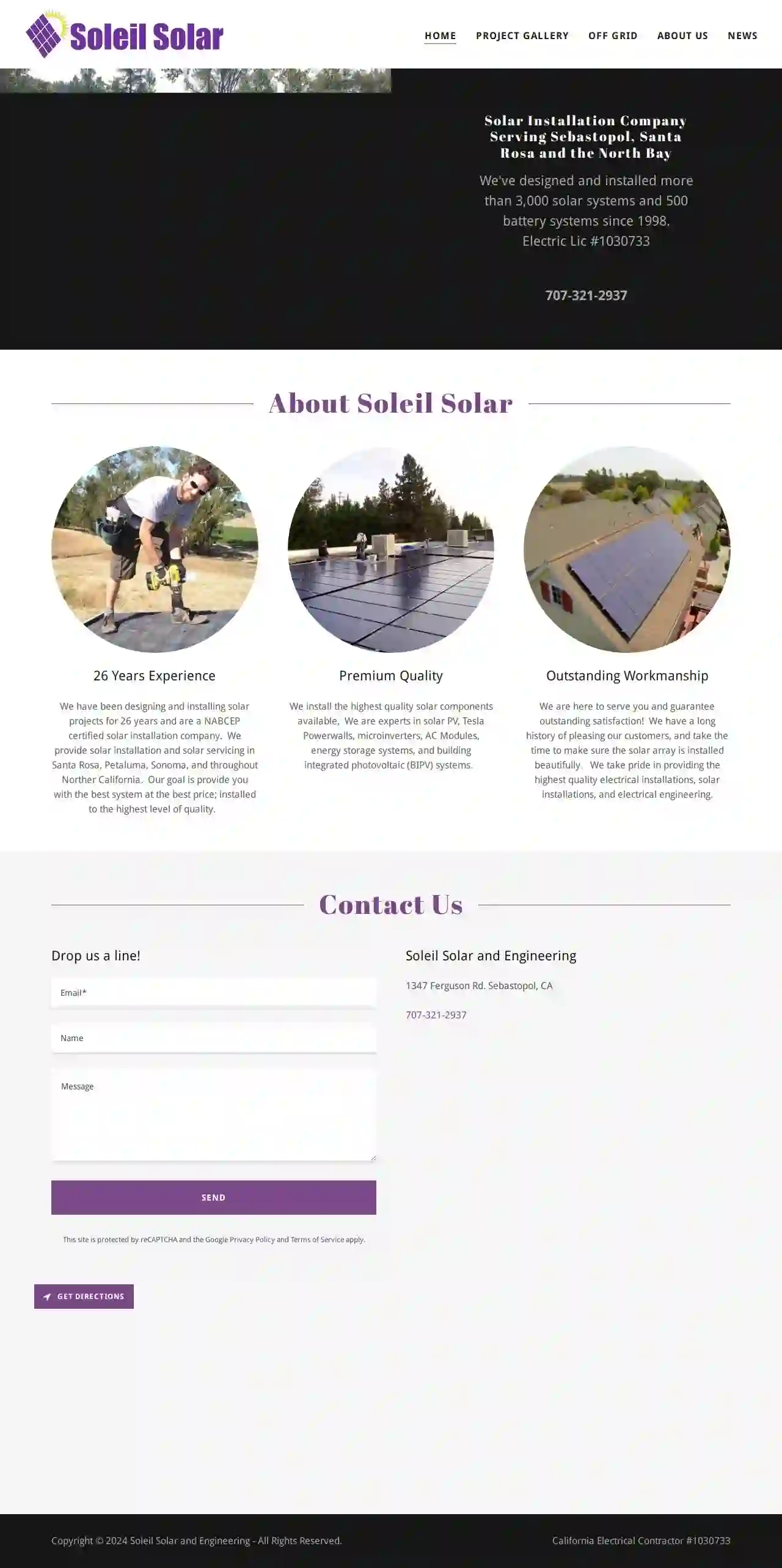Solar Installers East Hemet
Top 10 Solar Installers Near Me in East Hemet
Receive 3 FREE Local Solar Installers quotes for your project today! Compare profiles, reviews, accreditations, portfolio, etc... and choose the best deal.

Evergreen Solar
4.626 reviews123 Solar Way, Los Angeles, 90001, USEvergreen Solar is a fast growing Los Angeles based clean energy solutions company. They offer a variety of services including residential solar, commercial solar, and roofing. Their team is highly trained and ensures to provide the best experience at each step of the project. They pride themselves in the quality of their solar equipment, design, installation, and service.
- Services
- Why Us?
- Accreditations
- Our Team
- Testimonials
- Gallery
Get Quote
Cira Energy Inc
11 reviews1440 South State College, Suite 4B, Anaheim, 92806, USCira Energy is a family-run solar company based in California, dedicated to providing clean energy solutions through solar power. With over 30 years of combined experience in solar roof systems, roofing, and metal roofing, Cira Energy offers highly competitive prices for the quality they provide. Their mission is to help customers reduce or eliminate their utility bills by installing solar roof systems. As a sister company under Western Roofing Systems, Cira Energy ensures that their solar roofing and roofing professionals are well-versed in the installation of solar roof systems, making them a reliable choice for those seeking solar energy solutions in Southern California.
- Services
- Why Us?
- Accreditations
- Our Team
- Testimonials
- Gallery
Get Quote
Solar Panel Cleaners LLC
54 reviewsBeverly Hills, CA, 123 Solar Way, 90210, USSolar Panel Cleaners LLC is a leading provider of solar panel cleaning services, dedicated to enhancing the efficiency and longevity of solar panels. With a team of experienced professionals, we offer top-quality cleaning solutions tailored to meet the unique needs of each client. Our mission is to ensure that your solar panels operate at their maximum potential, saving you money and reducing your carbon footprint.
- Services
- Why Us?
- Accreditations
- Our Team
- Testimonials
Get Quote
Best Solar Power
458 reviews18321 Ventura Blvd, Suite 555, Tarzana, 91356, USBest Solar is a company founded in 2012 that provides homeowners with simple and affordable clean energy. They believe that going solar should be headache and hassle-free. Best Solar supplies the solar panels, and takes care of all the installation and paperwork for little to no upfront cost. They offer a cleaner and safer alternative to traditional utilities, allowing customers to save money by investing in their home.
- Services
- Why Us?
- Gallery
Get Quote
Roar Solar
56 reviewsRoar Solar Office, Suite 100, 123 Solar Way, Los Angeles, 90001, USRoar Solar is a leading provider of solar energy solutions, offering top-notch services and personalized support to homeowners in Southern California. With a focus on quality, integrity, and customer satisfaction, Roar Solar aims to help individuals produce their own power and save on energy costs. Their team of experts ensures quick and efficient installation, maintenance, and monitoring of solar systems, batteries, and EV charging solutions. Roar Solar partners with quality brands and offers financial solutions to make solar energy accessible to everyone.
- Services
- Why Us?
- Accreditations
- Our Team
- Testimonials
- Gallery
Get Quote
Solar Crew
123 Main St, Anaheim, 92801, USRooms, Covers 'N Solar is a family-owned and operated business with over 45 years of experience in the patio cover industry. They specialize in providing high-quality patio products, including solid flat plans, open lattice, insulated roof panels, combinations, free-standing structures, multi-level designs, equinox louvered, deluxe standard, gabled rooms, garden rooms, patio rooms, screen rooms, sun rooms, and under existing structures. They also offer solar panels and commercial services. Their commitment to customer satisfaction and personal service has earned them an 'A' rating and numerous positive reviews.
- Services
- Why Us?
- Accreditations
- Our Team
- Testimonials
- Gallery
Get Quote
Soleil Solar
3.45 reviews1347 Ferguson Rd., Sebastopol, 95472, USSolar Installation Company Serving Sebastopol, Santa Rosa and the North Bay. We've designed and installed more than 3,000 solar systems and 500 battery systems since 1998.
- Services
- Why Us?
- Accreditations
- Our Team
- Gallery
Get Quote
Planet Plan Sets LLC
1630 S. Sunkist St. Suite E., Anaheim, CA 92806-5816, 92806-5816, USPlanet Plan Sets is a full service provider of solar plan sets for residential PV installations. Our team has decades of combined experience in the solar industry. We believe PV is a better way to power our future and by reducing the complexity of plan set generation, we help contractors focus on what they do best – installing PV systems. We are committed to reducing the cost, time, and hassle of drafting plan sets for solar installations. We strive to exceed customer expectations by delivering cost effective solar plan sets quickly and reliably, with customer support and service that sets us apart from the competition.
- Services
- Why Us?
- Accreditations
- Our Team
- Testimonials
- Gallery
Get Quote
Infinity Solar Systems Riverside
4.25 reviewsOrange, CA, 749 N Main St, 92868, USInfinity Solar is a leading provider of solar energy solutions in Southern California. With a focus on sustainability and customer satisfaction, they offer a range of services including solar panel installation, home battery solutions, and solar insurance. Their team of experts is dedicated to helping homeowners make the switch to solar energy and enjoy the benefits of renewable energy.
- Services
- Why Us?
- Accreditations
- Our Team
- Testimonials
- Gallery
Get Quote
Los Angeles Solar Pros
54 reviews123 Solar Way, Suite 100, Montebello, 90640, USLos Angeles Solar Pros is a reputable company that specializes in solar panel installation and solar battery storage. They provide residential and commercial installation services and have completed many successful projects. Their team is skilled and knowledgeable, ensuring that the installation process is completed on time and within budget. They offer a free consultation to determine if your roof is suitable for solar panels and battery storage.
- Services
- Why Us?
- Accreditations
- Our Team
- Testimonials
- Gallery
Get Quote
Over 4,210+ Solar Installers in our network
Our solar companies operate in East Hemet and surrounding areas!
SolarCompaniesHub has curated and vetted Top Solar Installers near East Hemet. Find a reliable pro today.
Frequently Asked Questions About Solar Installers
- Contact SolarCompaniesHub: We make it simple to connect with reputable Solar Installers in your area.
- Get Free Quotes: Request free quotes from multiple installers to compare prices, systems, and warranties.
- Schedule a Site Assessment: A qualified installer will visit your property to assess your roof, energy needs, and discuss your goals.
- Review Your Proposal and Contract: Carefully review the proposed system, financing options, and warranties before signing a contract.
- Installation and Activation: Once the contract is signed, the installer will obtain necessary permits, schedule the installation, and activate your solar system.
- Solar Panel Warranty: From the panel manufacturer, typically covering defects in materials and workmanship for 10-25 years. Some manufacturers offer performance guarantees, ensuring a certain level of energy output over time.
- Solar Installation Warranty: From the solar installer, covering the quality of the installation work for 1-10 years. This warranty protects you from leaks, faulty wiring, or other issues caused by improper installation.
How do I get started with solar panel installation?
Do I need planning permission to install solar panels in USA?
How do solar panels work?
What kind of warranty should I expect for my solar panel system?
How do I get started with solar panel installation?
- Contact SolarCompaniesHub: We make it simple to connect with reputable Solar Installers in your area.
- Get Free Quotes: Request free quotes from multiple installers to compare prices, systems, and warranties.
- Schedule a Site Assessment: A qualified installer will visit your property to assess your roof, energy needs, and discuss your goals.
- Review Your Proposal and Contract: Carefully review the proposed system, financing options, and warranties before signing a contract.
- Installation and Activation: Once the contract is signed, the installer will obtain necessary permits, schedule the installation, and activate your solar system.
Do I need planning permission to install solar panels in USA?
How do solar panels work?
What kind of warranty should I expect for my solar panel system?
- Solar Panel Warranty: From the panel manufacturer, typically covering defects in materials and workmanship for 10-25 years. Some manufacturers offer performance guarantees, ensuring a certain level of energy output over time.
- Solar Installation Warranty: From the solar installer, covering the quality of the installation work for 1-10 years. This warranty protects you from leaks, faulty wiring, or other issues caused by improper installation.